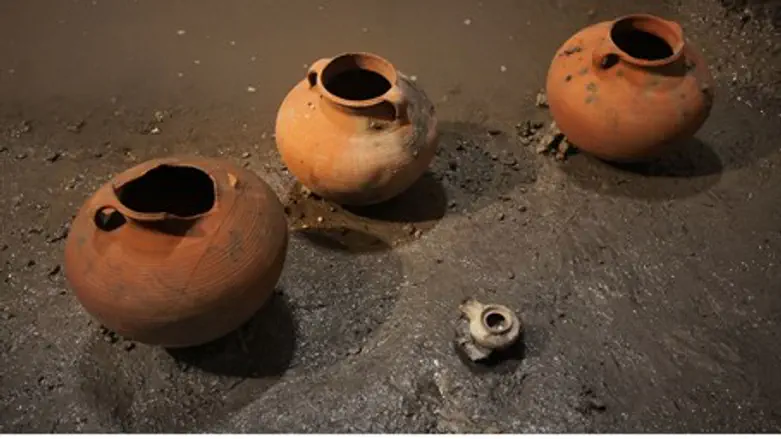
Archaeologists announced Thursday that they had found the first historical evidence verifying the fear and terror imposed on Jews during the period of the destruction of the Second Temple by both Roman soldiers and extremist Jewish rebels. The evidence consists of three small pots that had been used for food, discovered inside an underground water channel.
The discovery was made near the Kotel, in a dig being conducted at Robinson's Arch. Archaeological Authority workers discovered three clay pots and a candleholder. According to dig leader Eli Shukrun, the find indicates that a family had been taking shelter in the underground water channel, eating food there and avoiding being seen by Roman soldiers, as well as Jews who would have tried to take away their food.
The scenario matches several described by Josephus in his works on the Roman destruction of Jerusalem. One of the strategies of the Jewish rebels seeking to overthrow Roman rule was to starve out their fellow Jews, on the theory that if Jews did not have food, they would be more motivated to rebel and fight to take food from the Romans. The Talmud tells the story of how rebels burned down large storehouses of wheat and other grains, in order to force Jews to join them.
In his book, Josephus describes the extremely difficult situation faced by the Jews: A total breakdown of Jewish governmental authority, mass starvation, the danger of being seized by Roman soldiers and turned into slaves, and random murders. In addition, Jews feared being accosted by extremist rebels, who would take away their food and try to impress them into the rebel army. Josephus describes how many Jews who had a little food hid it in underground, secret passageways, where they would go to eat, away from the dangers of the Romans, and far from the eyes of the rebels. The new finding, said Shukrun, matched this account perfectly.
The findings will go on display in the annual Conference for Research on the City of David, set for next Monday in Jerusalem.
Hebrew video: